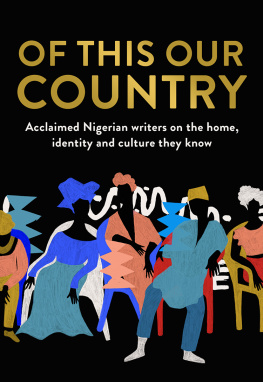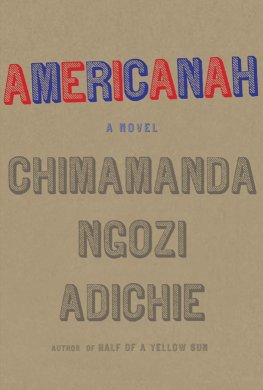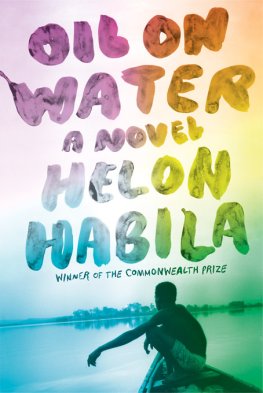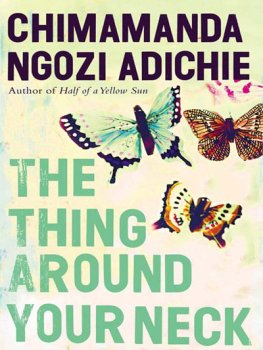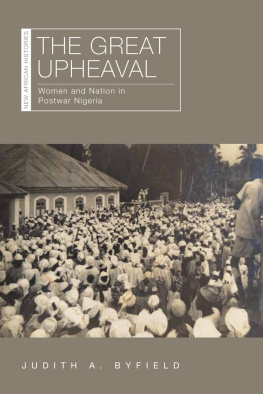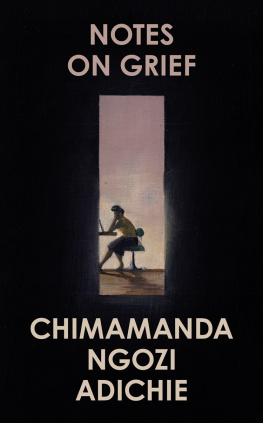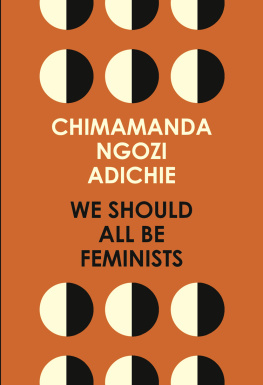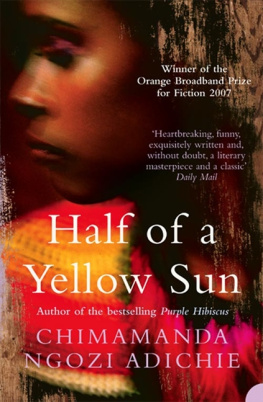Contents
Guide

The Borough Press
An imprint of HarperCollinsPublishers Ltd
1 London Bridge Street
London SE1 9GF
www.harpercollins.co.uk
First published in Great Britain by HarperCollinsPublishers 2021
Clarion Calls Aybmi Adby; Home History Caleb Femi; Fathers Land Umar Turaki; Of Country and Reverie Irenosen Okojie; A Brief History of Suya. Inua Ellams; Coming to Lagos Helon Habila; Still Becoming Chimamanda Ngozi Adichie; Elephants and Giraffes Oyinkan Akande; Against Enough J K Chukwu; Life is a Marketplace Chkdl Emelmad; Rites of Passage Anietie Isong; Until We Meet Again Hafsa Zayyan; Nostalgia is an Extreme Sport Lola Shoneyin; Amaechina Chika Unigwe; One Season, Many Decades, Abubakar Adam Ibrahim; War and Peace Okey Ndibe; A Banner Without Stain Ike Anya; Pride and Punishment Chigozie Obioma; Contradictions Bolu Babalola; Nulli Secundus Nels Abbey; #RepresentationMatters: The Oppressor in the Mirror Yomi Adegoke; Education as Saviour Cheluchi Onyemelukwe; Renewal Sefi Atta; You Are Not Going Back Abi Dar
Still Becoming by Chimamanda Ngozi Adichie was first published in Esquire Magazine (May June 2019)
The moral rights of the authors have been asserted
Cover illustration Diana Ejaita
Cover design by Holly Macondald HarperCollinsPublishers Ltd 2021
This book is a work of non-fiction based on the authors experiences.
A catalogue copy of this book is available from the British Library.
All rights reserved under International and Pan-American Copyright Conventions. By payment of the required fees, you have been granted the non-exclusive, non-transferable right to access and read the text of this e-book on screen. No part of this text may be reproduced, transmitted, down-loaded, decompiled, reverse engineered, or stored in or introduced into any information storage and retrieval system, in any form or by any means, whether electronic or mechanical, now known or hereinafter invented, without the express written permission of HarperCollins.
Source ISBN: 9780008469269
Ebook Edition SEPTEMBER 2021 ISBN: 9780008469283
Version: 2021-07-13
If you want to know a country, read its writers.
Aminatta Forna, Survival instincts, Guardian, April 24, 2009
Contents
In September 2020, while the world was locked inside, people were once again falling into other worlds, through podcasts, through films, through TV, through books. Books in particular became a new haven for those who found themselves lost during the pandemic. In the books they read, they discovered solace and escape among the stories created by different writers and visited different cities, cultures and histories on every page.
As avid readers ourselves, we couldnt help but notice how many of the stories being acquired, published and widely read were written by Nigerians, nor could we deny the exceptional quality of their work. From prizewinners to emerging talent, Nigerian writers were topping charts globally and making an impact not only within the publishing industry, but outside it too.
We realized that storytelling among Nigerians wasnt just a coincidence, but part of a national and cultural inheritance. We knew then that to bring so many of those writers together would be something special, and that in doing so, we two Nigerian women could enable readers to explore Nigeria through the memories and experiences of the phenomenal writers it has produced. After narrowing down an extensive list of incredible writers, we recognized that a cohesive collection would need a brief that anchored it to a single concept, while giving each writer the creative freedom to approach it in their own way:
The Brief
Form
Content
Reflections on the Nigeria that you know
A memory or memories you have of Nigeria that is/are significant to you
How and where you have experienced Nigeria, whether that be in the country itself, or in an aspect of its culture and traditions found elsewhere in the world
This collection including the cover, also designed by a Nigerian is a powerful and unforgettable response to that brief, a vital contribution to national conversations, and attests to the centrality of storytellers in any society.
Ore Agbaje-Williams & Nancy Adimora
The Editors, Of This Our Country
I
At one of the four primary schools I attend, I learn to sing the national anthem before I know the words. By the time I enrol in the third one, a Catholic school, I can gauge the interval between the anthems notes and guide my voice through its rhythms. I sing with a mix of abandon and confidence that I will leave behind in childhood. My renditions are always part of a student bodys, so my errors stay nestled in our chorus, unnoticed by anyone who can correct them. What I know in those early years I learn by osmosis, fumbling through gibberish to wrong words until I know the right ones.
Pledging allegiance to the country and singing its anthem is customary in educational institutions across Nigeria. Tertiary institutions often restrict this show of patriotism to formal ceremonies. In primary and secondary schools, though, days begin with routines that include both the anthem and the national pledge. In my Catholic school, we call this the morning assembly. It begins thirty minutes before classes are scheduled to start and is held on the large school lawn. A teacher prays, we sing a hymn, then theres a charge from scripture. Sometimes there is a Bible reading. Always, this part of the day seems guided towards dual climaxes: the anthem and the pledge. We sing both stanzas of the national anthem if we are on time and settle for just the first if an earlier component of the morning assembly has lasted too long. We recite the pledge with our right palms pressed over our hearts. In all, this daily attempt to inculcate virtue in us before our minds are submitted to knowledge lasts about twenty minutes.
When they were schoolchildren, my parents participation in this process of interpellation featured other anthems. My father was born five years before Independence and he probably sang God Save The Queen a few times before he had to learn a new song of allegiance. In 1960, when colonial totems were superseded by newly minted national symbols, Nigeria We Hail Thee replaced prayers for a coloniser and for eighteen more years, Nigerians pledged fealty with a song composed by Britons.
The anthem I butcher is the first to have been composed by Nigerians. Eventually, I discover its correct lyrics on the back of a notebook and realize that the third word in the song is compatriots. This clarification comes after I have mastered the anthems melody and felt transported by several earnest if meaningless moments of unisonance. For a while Im embarrassed by the knowledge that I spent years bellowing arise o compassions, then I come to know that many of my peers did the same and shame recedes, making room for amusement.
Even when I know the right lyrics, I continue to sing the anthem mindlessly. Though the words I now use are correct, they remain opaque to me, revealing nothing of the ideas and imperatives they are meant to conjure. Nigeria, compatriots, and arising to obey a countrys call are abstractions to me until the day my father sticks branches in front of his car so he can get me to school.

